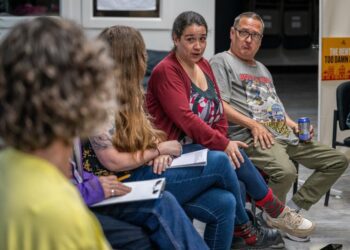Nova’s new docuseries, Sea Change: The Gulf of Maine, a looks at the impact on climate change this … [+] body of water which feeds 3,000 species. Aired on PBS on July 24, 2024.
Brian Skerry
The Gulf of Maine is warming 97% faster than the global ocean. It stretches from the tip of Cape Code to Novia Scotia in the North Atlantic, covering 36,000 square miles (93,000 km2). It feeds a diverse ecosystem of 3,000 species, ranging from microscopic plankton to massive right whales.
A new special three-part docuseries — Sea Change: The Gulf of Maine, a NOVA Special Presentation—produced by GBH, the largest producer of content for PBS, investigates global ocean change and how it impacts sea life, wildlife, marine ecosystems and local communities.
The Gulf of Maine is warming 97% faster than any other ocean surface on the planet. Warming waters threaten critical marine ecosystems and are a preview of the effects on oceans globally as a result of climate change. However, according to the Gulf of Maine Research Institute, this also provides an opportunity to develop climate resilience, and adaptation strategies can be developed—such as climate adaptation strategies for fishing communities—and implemented in other regions affected by climate change.
Using science, exploration, and natural history, Sea of Change vibrantly shows the impact of climate change on the Gulf of Maine’s marine ecosystems. It highlights global implications of the ecosystem from communities working and living in this vital marine ecosystem.
The epic oceanic docuseries also looks at the challenges the Gulf of Maine faces to retain biodiversity and maintain regenerative strength to weather the impact of climate change through the people who live and work in the Gulf.
The series is part of a larger project initiated by National Geographic marine photographer Brian Skerry. Skerry, also a producer of Sea of Change, lives in Maine, and for the past 40 years, he has been photographing the Gulf of Maine to document its changing conditions caused by climate change.
According to Skerry, in the past several years it’s been difficult to document the Gulf’s changes. “It’s hard to photograph nothing, when so much of the environment has already been altered or erased,” said Skerry in a prepared statement.
“I’ve always had a deep love for the Gulf of Maine as a New England native and a current resident,” said Skerry in a prepared statement. “Every other breath we take is of oxygen that was generated from our oceans. But they are now in peril, something that we can document deeply in the Gulf of Maine, an area that has provided for this continent long before the arrival of Europeans and far into the last century.”
“What once provided a seemingly endless supply of cod fish, lobsters, and clams, now allows us to witness firsthand the devastating changes brought on by climate change. It’s my hope that this series serves as a cautionary tale, as well as a tribute to one of my favorite places,” added Skerry.
Filmmakers Chun-Wei Yi and Stella Cha highlight the resilience of the thousands of people working to sustain the Gulf of Maine. The Sea of Change features a biologist who is also a lobsterman, Native American clam farmers, seaweed entrepreneurs, and scientists on their expedition to a remote area of the Gulf to find answers.
The docuseries also shows the intricate marine life in the Gulf from the grain-of-rice-sized mud shrimp to hundreds of thousands of semipalmated sandpipers.
“It’s a fantastically diverse story with unforgettable images,” said GBH co-executive producer John Bredar,
The three-part series aired on PBS on July 24 includes “Bounty,” “Peril,” and “Survival.” Sea Change also includes a six-part short-form digital series produced by Indigenous filmmakers in collaboration with Vision Maker Media and NOVA, focused on climate issues and solutions in Native communities across the country.
Sea Change: The Gulf of Maine, a NOVA Special Presentation, is available to stream on station-branded PBS platforms, including PBS.org and the PBS App, which is available on iOS, Android, Roku, Apple TV, Amazon Fire TV, Android TV, Samsung Smart TV, Chromecast and VIZIO.
Source link : http://www.bing.com/news/apiclick.aspx?ref=FexRss&aid=&tid=66cb81db431742668e9bb34e004218b1&url=https%3A%2F%2Fwww.forbes.com%2Fsites%2Fjenniferkitepowell%2F2024%2F08%2F25%2Fnovas-new-docuseries-shows-impact-of-climate-change-on-gulf-of-maine%2F&c=8591773184839461803&mkt=en-us
Author :
Publish date : 2024-08-25 07:27:00
Copyright for syndicated content belongs to the linked Source.






